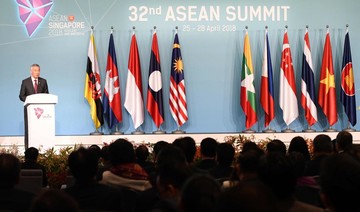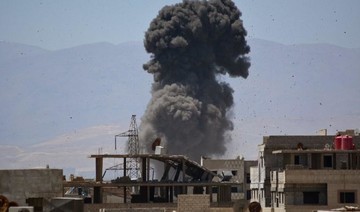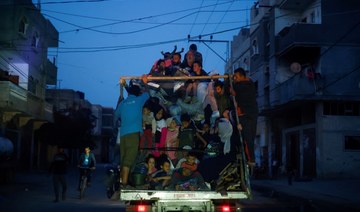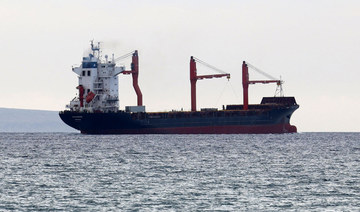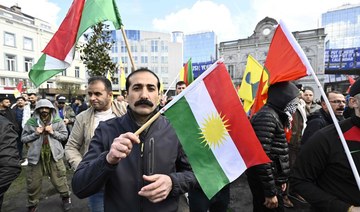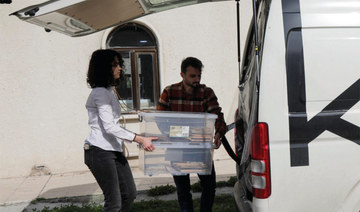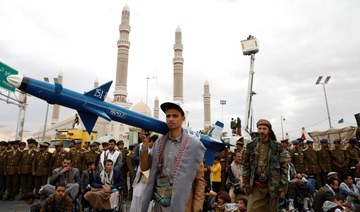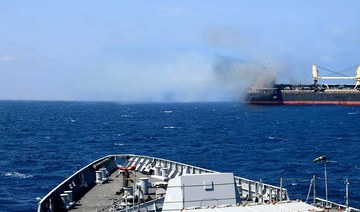TEL KEIF, Iraq: The entire trial lasted just over half an hour. A grey-haired man was led into the defendant’s booth. He fidgeted as the judge read the charges against him: Swearing allegiance to the Daesh group and working for the militants as an employee at a water station.
“Not guilty,” the defendant, Abdullah Al-Jabouri, told the judge in a session of one of Iraq’s counterterrorism courts this week. He said he had worked for Nineveh province’s water department for more than 20 years and stayed at his post when Daesh took over in 2014, but he denied ever swearing allegiance to the group.
“All government employees continued in their jobs at the water facility,” the 47-year-old Sunni Arab protested.
“I am asking you to speak only about yourself,” the judge interrupted him. Soon after, the judge and his two associates went into deliberations. A few minutes later they returned with their verdict: Guilty, sentenced to 15 years in prison. Al-Jabouri, his head bowed, was quickly led out and the next accused Daesh member was ushered in.
Iraq is holding huge numbers of detainees on suspicion of ties to the Daesh group — around 11,000, according to Iraqi officials — and they are being rushed through counterterrorism courts in trials that raise questions over whether justice is being done. At the same time, families are often left in the dark about where their loved ones are being detained or what their fates are.
The Associated Press last week attended several trials being held in Tel Keif, north of Mosul.
Throughout the system, the trials are usually short, often less than 30 minutes, and most end with guilty verdicts. Convictions are based on confessions that defendants and rights groups say intelligence agents extract by intimidation, torture and abuse. Also used as evidence are reports from anonymous informants, raising the possibility of false accusations made as revenge against rivals. The same defense lawyer works dozens of cases, with little knowledge of the defendants.
Moreover, even limited involvement with Daesh can bring harsh punishment. Under Iraq’s terror law, only three punishments are permitted — 15 years in prison, life imprisonment or execution by hanging. All verdicts are reviewed by Iraq’s Supreme Court.
“The system is built on an unjust foundation,” said one defense lawyer, Mahfoudh Hamad Ismael. “These suspects’ cases are done and finished the first day they enter a security detention center or an intelligence facility.”
The swift, truncated sessions reflect in part how Iraq’s judicial system has been overwhelmed by the influx of detained Daesh suspects. Rights groups have long criticized Iraqi courts, saying they struggle to uphold due process. Now they must work through thousands captured in broad sweeps carried out as Iraqi forces retook the northern city of Mosul last year.
Many Iraqis are also thirsty for quick retribution against a group that was notorious for its atrocities.
Prime Minister Haider Al-Abadi, who is running to retain his position in national elections next month, has repeatedly called for death sentences to be sped up. Since 2013, more than 3,000 people convicted on terror charges have been sentenced to death, according to a spreadsheet of Iraqi prison inmates analyzed by the AP. Since 2014, about 250 executions have been carried out. On April 16, the government announced it had executed 11 militants.
The heavy-handed, broad-brush crackdown in the courts threatens to further alienate Iraq’s Sunni Arab minority. Sunnis were the main community living under the Daesh group’s rule, both its recruiting base and its victims.
Some actively supported the group, joining its ranks as fighters or taking up significant positions in the government it created. But tens of thousands more worked with the group because they had no choice, either forced to cooperate or dependent on government jobs that now fell under the militants’ control.
During the AP’s visit Sunday to the Nineveh Criminal Court in Tel Keif, police officers hustled through the halls carrying armloads of case folders. A row of men awaiting trial crouched on the floor, facing the wall, hands cuffed.
Over the past year, the court has issued more than 815 verdicts on terrorism charges, said court spokesman Abdul Satar Bayraqdar. Of those, 112 were acquitted, 201 were sentenced to death, 150 to life in prison, and 341 to 15 years in prison. He said 1,715 detainees were released without trial. The most recent death sentence was issued April 19, to a man convicted of serving as a judge for the Daesh group, he said.
In one of the trials, the defendant, Salim Ahmed, stood in court with his hands cuffed behind his back, trembling.
The judge, Younus Al-Jumaily, read three documents. One was testimony from “secret informant number 130,” who said that Ahmed “showed sympathy and willingness to join the organization” and that he saw Ahmed carrying an assault rifle and working in the Daesh traffic police department. The judge also read a Kurdish intelligence report saying Ahmed confessed to joining Daesh, as well as a report from Iraqi intelligence saying he had sworn allegiance to the group.
“I swear to God, I swear to God, I swear to God, I am innocent,” Ahmed said. “I am a father of daughters. I did not give allegiance to the organization.” He said he worked in construction during Daesh rule.
He said he was forced to sign the confession without knowing what it said. “I was blindfolded all the time, I was under threat, and they forced me to put my fingerprint on these papers,” he said. He argued the secret informant’s testimony “could be written by anyone who hates me.”
The judges handed down a sentence of 15 years, noting that it was the lightest punishment. “He worked with Daesh traffic police. He didn’t fight for them,” Al-Jumaily said. The entire proceedings took just over 20 minutes.
The trial of Al-Jabouri, the water department employee, went similarly. The judge read out an intelligence report, an alleged confession and a report by the mayor of the village where Al-Jabouri worked. The mayor said Al-Jabouri’s family were known to be Daesh members and that Al-Jabouri worked in the water department under Daesh. But he said he never saw Al-Jabouri carry a gun or wear the militants’ distinct Afghan-style garb.
Al-Jabouri insisted on his innocence. He pointed out that Baghdad continued to pay his salary for months after the Daesh takeover — as the central government did for all public employees — and that he left the post several months later.
But the judge pressed Al-Jabouri, presenting the testimony in the documents again. “What do you say?“
“As you like,” Al-Jabouri replied, seemingly resigned that defense was futile.
“Look, it’s not ‘as I like’. What do you say about the accusations?” the judge retorted.
AL-Jabouri said his confession was “taken under fear and threat” and the reports by the mayor and intelligence chief were wrong.
After eight minutes of deliberations, the judges found him guilty and sentenced him to 15 years.
Meanwhile, the families of the thousands of Sunni Arabs in custody are largely in the dark about their loved ones’ fates. Most are never even told where their relatives are being detained and rely on word of mouth to gain information.
Two former detainees interviewed by AP reported harrowing conditions in Iraqi detention — from overcrowding and scabies outbreaks to improvised toilets made from plastic bags and water bottles.
Up the road from the courthouse in Tel Keif, a prison holds some 1,500 people, most waiting for trial.
An official showed The Associated Press five areas of the prison: a courtyard where women and their children were in the sunshine; a densely packed room for minors; two rooms of men, packed in shoulder to shoulder, all seated or crouching on the ground; and room where men who have been sentenced were eating lunch. At least one of the rooms had dark streaks and handprints on the walls that appeared to be excrement.
Outside the courtroom, one Iraqi woman came early, hoping for the chance to see her son, Kahtan, a 28-year-old doctor who was arrested in Mosul in the spring of 2017. She asked to be identified as Umm Kahtan, Arabic for Kahtan’s mother, for fear of reprisals by colleagues and neighbors.
She had been able to retain a lawyer, who had notified her about the trial session. After a sleepless night of prayer and reading the Qur’an, she arrived at the court at 7:30 a.m., ahead of its opening at 9 a.m. She brought a plastic bag of documents in her purse and two witnesses to attest to her son’s character.
She waited all day in the sun, refusing offers to sit, walking over to guards repeatedly to ask about her son’s case. Finally, at 2 p.m., the end of the work day, her lawyer walked out with a group of colleagues on the way to lunch. The case had been delayed, he told her.
Umm Kahtan rejoiced. At least today he would not be sentenced.
But she had hoped to finally see her son.
“They didn’t even allow me to go inside and just to have a look at him.”
Iraq’s Daesh trials bring swift verdicts, almost all guilty
Iraq’s Daesh trials bring swift verdicts, almost all guilty
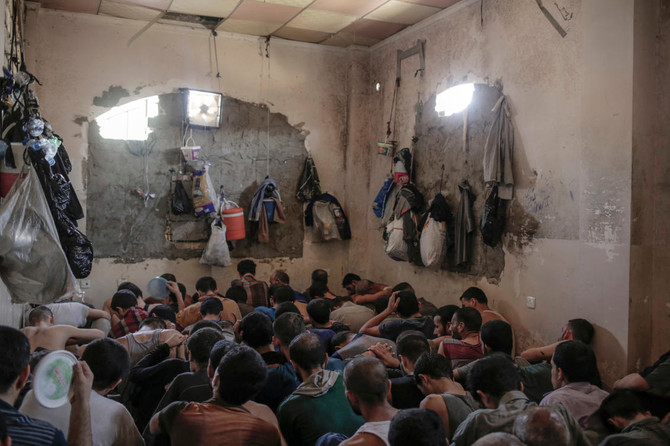
- Iraq is holding huge numbers of detainees - around 11,000 - on suspicion of ties to the Daesh group
- Throughout the system, the trials are usually short, often less than 30 minutes, and most end with guilty verdicts
Iraq requests end of UN assistance mission by end-2025
- Prime PM said Iraq wanted to deepen cooperation with other UN organizations but there was no longer a need for the political work of the UN assistance mission
The mission, headquartered in Baghdad’s heavily fortified Green Zone, was set up with a wide mandate to help develop Iraqi institutions, support political dialogue and elections, and promote human rights.
Prime Minister Mohammed Shia Al-Sudani said Iraq wanted to deepen cooperation with other UN organizations but there was no longer a need for the political work of the UN assistance mission, known as UNAMI.
The mission’s head in Iraq often shuttles between top political, judicial and security officials in work that supporters see as important to preventing and resolving conflicts but critics have often described as interference.
“Iraq has managed to take important steps in many fields, especially those that fall under UNAMI’s mandate,” Sudani said in a letter to UN Secretary-General Antonio Guterres.
Iraq’s government has since 2023 moved to end several international missions, including the US-led coalition created in 2014 to fight Islamic State and the UN’s mission established to help promote accountability for the jihadist group’s crimes.
Iraqi officials say the country has come a long way from the sectarian bloodletting after the US-led invasion and Islamic State’s attempt to establish a caliphate, and that it no longer needs so much international help.
Some critics worry about the stability of the young democracy, given recurring conflict and the presence of many heavily armed military-political groups that have often battled on the streets, the last time in 2022.
Some diplomats and UN officials also worry about human rights and accountability in a country that frequently ranks among the world’s most corrupt and where activists say freedom of expression has been curtailed in recent years.
Iraq’s government says it is working to fight corruption and denies there is less room for free expression.
Somalia’s government also requested the termination of a UN political mission this week. In a letter to the Security Council, the country’s foreign minister called for the departure of the Nations Assistance Mission in Somalia (UNSOM), which has advised the government on peace-building, security reforms and democracy for over a decade. He provided no reason.
Gaza aid could grind to a halt within days, UN agencies warn
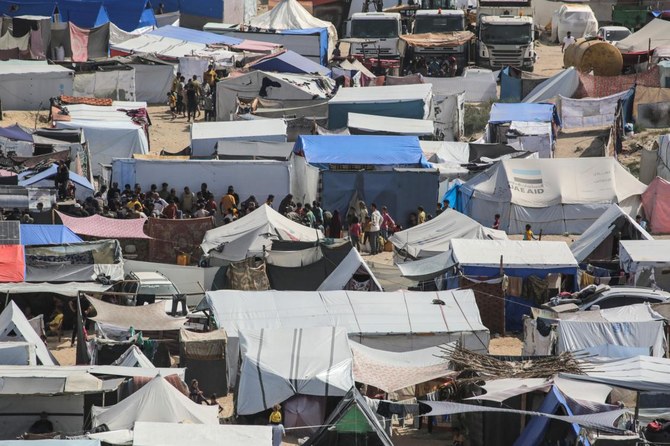
- Humanitarian workers have sounded the alarm this week over the closure of the Rafah and Kerem Shalom crossings for aid
LONDON: Dwindling food and fuel stocks could force aid operations to grind to a halt within days in Gaza as vital crossings remain shut, forcing hospitals to close down and leading to more malnutrition, United Nations aid agencies warned on Friday.
Humanitarian workers have sounded the alarm this week over the closure of the Rafah and Kerem Shalom crossings for aid and people as part of Israel’s military operation in Rafah, where around 1 million uprooted people have been sheltering.
The Israeli military said a limited operation in Rafah was meant to kill fighters and dismantle infrastructure used by Hamas, which governs the besieged Palestinian territory.
“For five days, no fuel and virtually no humanitarian aid entered the Gaza Strip, and we are scraping the bottom of the barrel,” said the UNICEF Senior Emergency Coordinator in the Gaza Strip, Hamish Young.
“This is already a huge issue for the population and for all humanitarian actors but in a matter of days, if not corrected, the lack of fuel could grind humanitarian operations to a halt,” he told a virtual briefing.
More than 100,000 people have fled Rafah in the last five days
More than 100,000 people have fled Rafah in recent days, said Young.
Israel’s military on Monday called for Gazans to leave eastern Rafah, which triggered widespread international alarm.
The UN children’s agency UNICEF said more than 100,000 had left, with the UN humanitarian agency OCHA putting the figure at more than 110,000.
All eyes have been on Rafah in recent weeks, where the population had swelled to around 1.5 million after hundreds of thousands of Palestinians fled fighting in other areas of Gaza.
Georgios Petropoulos, head of OCHA’s sub-office in Gaza, said the situation in the besieged Palestinian territory had reached “even more unprecedented levels of emergency.”
Countries around the world, including key Israeli backer the United States, have urged Israel not to extend its ground offensive into Rafah, citing fears of a large civilian toll.
Hamish Young, UNICEF’s senior emergency coordinator in the Gaza Strip, insisted Rafah “must not be invaded” and called for the immediate flow of fuel and aid into the Gaza Strip.
“Yesterday, I was walking around the Al-Mawasi zone, that people in Rafah are being told to move to,” he said, also speaking from Rafah.
“Shelters already lined Al-Mawasi’s sand dunes and it’s now becoming difficult to move between the mass of tents and tarpaulins.
AFP journalists in the Gaza Strip early Friday witnessed artillery strikes on Rafah on the territory’s southern border with Egypt.
Gaza’s bloodiest-ever war began following Hamas’s unprecedented October 7 attack on Israel that resulted in the deaths of more than 1,170 people, mostly civilians, according to an AFP tally of Israeli official figures.
Vowing to destroy Hamas, Israel has conducted a retaliatory offensive that has killed more than 34,900 people in Gaza, mostly women and children, according to the Hamas-run territory’s health ministry.
Turkiye says it killed 17 Kurdish militants in northern Iraq, Syria
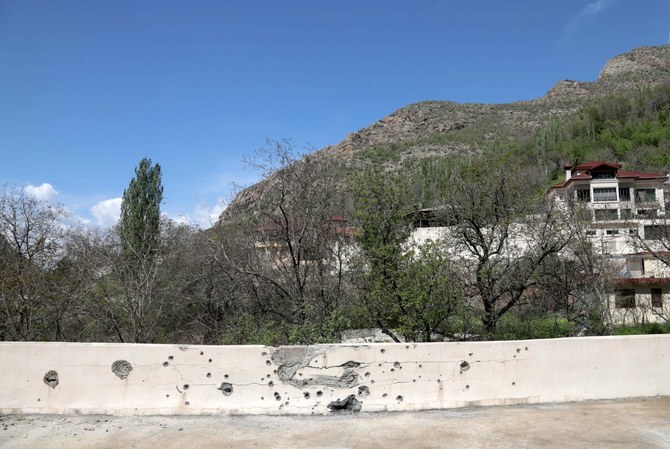
ANKARA: Turkish forces have killed 17 militants of the outlawed Kurdistan Workers Party (PKK) across various regions of northern Iraq and northern Syria, the defense ministry said on Friday.
In a post on social media platform X, the ministry said its forces had “neutralized” 10 PKK insurgents found in the Gara and Hakurk regions of northern Iraq, and in an area where the Turkish military frequently mounts cross-border raids under its “Claw-Lock Operation.”
It said another seven militants were “neutralized” in two regions of northern Syria, where Turkiye has previously carried out cross-border incursions.
The ministry’s use of the term “neutralized” commonly means killed. The PKK, which has been waging an insurgency against the Turkish state since 1984, is designated a terrorist organization by Turkiye, the United States and the European Union.
Turkiye’s cross-border attacks into northern Iraq have been a source of tension with its southeastern neighbor for years. Ankara has asked Iraq for more cooperation in combating the PKK, and Baghdad labelled the group a “banned organization” in March.
Last month, Turkish President Tayyip Erdogan held talks with officials in Baghdad and Irbil, the capital of Iraqi Kurdistan, about the continued presence of the PKK in northern Iraq, where it is based, and other issues. Erdogan later said he believed Iraq saw the need to eliminate the PKK as well.
Turkiye has also staged military incursions in Syria’s north against the YPG militia, which it regards as a wing of the PKK.
Erdogan and his ministers have repeatedly said that while Ankara is working on repairing ties with Syrian President Bashar Assad’s government after years of animosity, it will mount a new offensive into northern Syria to push the YPG away from its border.
Israeli demonstrators torch part of UN compound in Jerusalem
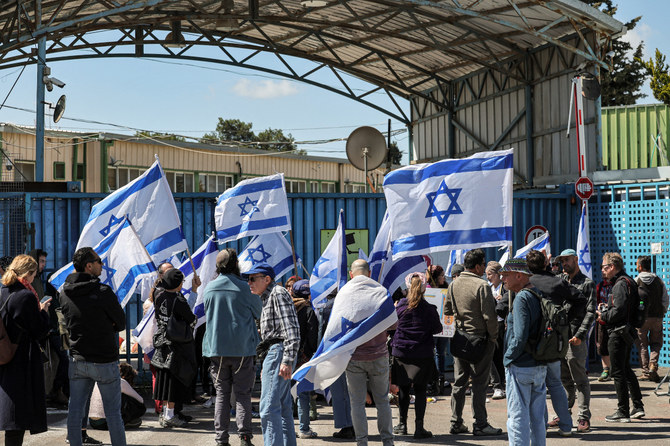
- Compound closed until proper security was restored
- Thursday’s incident was the second in less than a week
JERUSALEM: The main United Nations aid agency for Palestinians closed its headquarters in East Jerusalem after local Israeli residents set fire to areas at the edge of the sprawling compound, the agency said.
Philippe Lazzarini, the head of UNRWA, said in a post on the social media platform X that he had decided to close the compound until proper security was restored. He said Thursday’s incident was the second in less than a week.
“This is an outrageous development. Once again, the lives of UN staff were at a serious risk,” he said.
“It is the responsibility of the State of Israel as an occupying power to ensure that United Nations personnel and facilities are protected at all times,” he said.
This evening, Israeli residents set fire twice to the perimeter of the UNRWA Headquarters in occupied East Jerusalem.
— Philippe Lazzarini (@UNLazzarini) May 9, 2024
This took place while UNRWA and other UN Agencies’ staff were on the compound.
While there were no casualties among our staff, the fire caused extensive damage… pic.twitter.com/ZqHFDNkiWC
UNRWA, set up to deal with the Palestinian refugees who fled or were forced from their homes during the 1948 war around the time of Israel’s creation, has long been a target of Israeli hostility.
Since the start of the war with Gaza Israeli officials have called repeatedly for the agency to be shut down, accusing it of complicity with the Islamist movement Hamas in Gaza, a charge the United Nations strongly rejects.
Israel considers all of Jerusalem its indivisible capital, including eastern parts it captured in a 1967 war, which Palestinians seek as the future capital of an independent state.
Lazzarini said staff were present at the time of the incident but there were no casualties. However outdoor areas were damaged by the blaze, which was put out by staff after emergency services took time to respond.
There was no immediate comment from the Israeli police.
Lazzarini said groups of Israelis had been staging regular demonstrations outside the UNRWA compound for the past two months and said stones were thrown at staff and buildings in the compound this week.
In footage shared with Lazzarini’s post, smoke can be seen rising near buildings at the edge of the compound while the sound of chanting and singing can be heard.
A crowd accompanied by armed men were witnessed outside the compound chanting “Burn down the United Nations,” Lazzarini said.
UKMTO reports hijacking attempt of vessel east of Yemen’s Aden
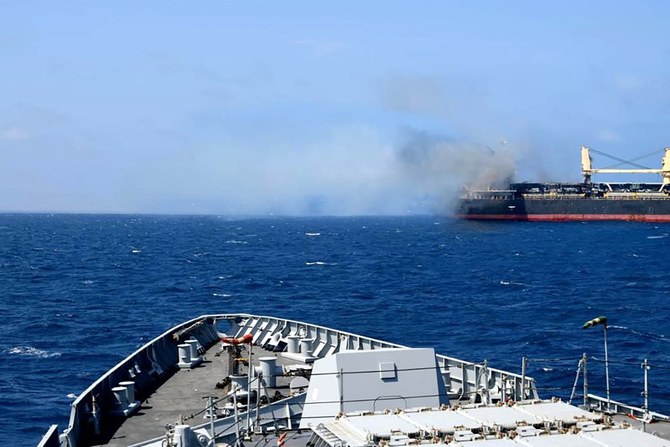
DUBAI: The United Kingdom Maritime Trade Operations (UKMTO) organization said on Friday it had received a report of a failed hijacking attempt of a vessel 195 nautical miles east of Yemen’s Aden.
The vessel’s master reported being approached by a small craft carrying five or six armed people with ladders.
Houthi militants in Yemen have launched drone and missile attacks on shipping in and around the Red Sea and the Indian Ocean to show support for the Palestinians in the Gaza war.
Maritime sources say pirates may be encouraged by a relaxation of security or may be taking advantage of the chaos caused by attacks on shipping by the Iran-aligned Houthis.
After firing on the vessel, the people in the small craft were forced to abort their approach when the security team on the vessel returned fire, the UKMTO reported.
The vessel and its crew are reported to be safe, and the vessel is proceeding to its next port of call, it said.


